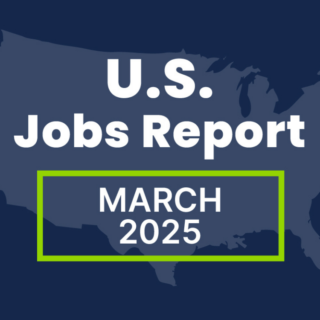The healthcare workforce is highly specialized. As a result, the healthcare workforce and labor market are uniquely competitive. To gain a competitive edge, healthcare organizations are looking for innovative recruiting solutions to find top-quality candidates who provide world-class care for patients.
In this post, we examine the trends in the healthcare workforce that will influence the future of healthcare recruitment.
Employer Branding for Healthcare Workforce
Top healthcare candidates have many options when it comes to employers and can easily research the experiences of employees in your organization on career sites such as Indeed and Glassdoor.
In fact, a survey conducted by LinkedIn found that 75 percent of job seekers consider an employer’s brand before applying for a job. What’s more, a study conducted by Healthcare Recruiters International found that over 90 percent of candidates think employer branding is an essential recruiting resource. So, how can you ensure you have an impactful employer brand?
How RPO Can Solve The Top Challenges In Healthcare Talent Acquisition
Conduct an Employer Brand Audit
Before developing your employer brand, you should conduct an employer brand audit. Your employer brand audit will help you understand how your brand distinguishes itself from competitors and provide a starting point from which you can build your strategy. Below are key questions to ask yourself during the audit:
- Why would someone want to work for you?
- What is the perception employees and candidates have about your organization?
- What percentage of your employees would recommend your company as a great place to work?
Set your Employer Brand Strategy
Prospective healthcare employees are similar to patients in that both select the healthcare provider they feel most comfortable with. Your employer brand strategy should help make a candidate’s choice easier and provide assurance that he or she has chosen the right employer. Your employer brand strategy should contain the following three components:
- Differentiators: A list of the benefits and unique qualities that are different or better about working at your healthcare facility.
- Employee Value Proposition: Using your list of differentiators, craft a brief paragraph that positions your organization against other healthcare employers and demonstrates why candidates view you as an employer of choice.
- Employer Brand Promotional Plan: Develop a plan to share your employee value proportion with candidates, including the tactics you will use, the tools you need and the schedule you will follow to attract potential new hires and retain current employees.
Promote Your Employer Brand to the Healthcare Workforce
Once you have established your employer brand, it is time to promote it. You can promote your employer brand by highlighting your workplace benefits and culture in recruiting materials, on your website and social media channels and in your job postings and candidate outreach emails. Some examples of ways to promote your employer brand include:
- Sharing videos and pictures of your workplace to show what working for your healthcare organization is like.
- Leveraging your social channels to show off your workplace and company perks so that a candidate can assess what you have to offer.
- Building a career site that makes visitors feel welcome and gives applicants the information they are looking for, such as details about employment opportunities, company culture and work environment.
- Telling engaging stories from current and former employees to better attract the type of healthcare candidates who could see themselves in those stories.
Diversity in the Healthcare Workforce
Healthcare is experiencing a shortage of workers, and professionals of diverse backgrounds are particularly underrepresented in many occupations and in the upper ranks of many healthcare organizations.
Minority Workers in the Healthcare Workforce
With demand in many healthcare professions at record levels, career opportunities abound for individuals of all backgrounds. However, Black, Hispanic and Indigenous Americans make up almost a quarter of the U.S. population, yet as a group, they account for only 6 percent of physicians, 9 percent of nurses and 5 percent of dentists according to the Sullivan Commission on Diversity.
Healthcare organizations can play a significant role in addressing this issue by:
- Promoting healthcare careers to diverse populations via school programs and community organizations.
- Encouraging students to shadow healthcare professionals and explore careers in healthcare.
- Recruiting ethnically diverse individuals for every-level positions to increase current minority representation.
- Offering internships, residencies and fellowships to ethnically diverse students. For example, the Institute for Diversity in Health Management in Chicago offers summer internships to college students.
Healthcare Workers with Disabilities
Individuals with disabilities can pursue successful careers in the healthcare field. Opportunities are available, but so are obstacles, from expensive equipment to accommodate workers to licensing requirements.
Some disabled healthcare workers take advantage of programs specifically designed to recruit those with disabilities. Project Search at the Cincinnati Children’s Hospital Medical Center gives high school students with disabilities the opportunity to learn about careers in healthcare. Healthcare organizations can also provide assistance to workers with disabilities by:
- Creating formal policies and procedures on accommodations for staff with disabilities. Invite employees with disabilities to work with on these policies.
- Making the online application process easier to use, with fonts that can be enlarged or a site that can be used with a screen reader.
- Advertising your healthcare organization as an equal opportunity employer and including contact information for anyone having problems accessing your organization because of a disability.
Aging Healthcare Workforce
According to the American Association of Colleges of Nursing the median age of a Registered Nurse (RN) is 46 years old. Plus, more than a quarter of RNs report they plan to retire or leave nursing over the next five years. These demographic trends portend significant employment challenges in the near future in the U.S.
Healthcare employers will need to rethink their current employment policies and practices to simultaneously retain talented older staff and create job opportunities for new workers of all ages. Many healthcare organizations are taking proactive steps to confront the problems that will occur as the healthcare workforce matures. Some of these strategies include:
- Developing strong outreach mechanisms to attract promising senior candidates to healthcare management careers.
- Publicizing career advancement opportunities, such as continuing education, professional development organizations, networking events and vacancies inside the organization, in a manner that appeals to everyone, especially older individuals.
- Creating environments that encourage retention, development and promotion of qualified elderly or senior employees.
Greater Use of Technology
As technology continues to become more sophisticated, it will play an increasingly important role in finding and hiring talent in healthcare. In fact, according to Ideal, 96% of senior HR professionals believe AI has the potential to greatly enhance talent acquisition and retention.
AI can help reduce unconscious bias during the hiring process by anonymizing candidates and focusing on skills, not age, gender or race, auto. AI technology can also be used to improve the screening process and manage interview scheduling.
Drafting Better Job Posts
Finding the right candidate in the healthcare workforce begins with the right job posting. In fact, it is often the first thing candidates see from your organization, so it is important to make a good impression.
Today, AI technology can utilize algorithms to assess and analyze language patterns in job postings to determine why some fail and others succeed and suggest keywords to make job descriptions more appealing to candidates. As the AI technology analyzes more job posts, it becomes more accurate with its language suggestions, helping employers draft precise job descriptions.
While there may never be a perfect job posting, AI technology is getting us closer.
Advanced Candidate Screening
Traditionally, candidate screenings begin with reviewing an applicant’s resume followed by a brief phone call. This means that recruiters and hiring managers have only their judgment of a resume to assess whether a healthcare candidate would make a good hire.
Healthcare recruiters know that resumes are an incomplete picture of someone’s skills, achievements, capabilities and most importantly, personality and culture fit.
AI technology can also be used to cull data and metrics healthcare organizations have on their employees to build predictive models and personality profiles that help lead to candidates who fit the company culture and job requirements more accurately and can reduce time-to-fill metrics.
Automating Recruiting Tasks
In healthcare recruiting, administrative tasks such as resume screenings and scheduling interviews can be time-consuming. With the assistance of AI, recruiters and hiring managers can reduce their time spent conducting administrative work by using AI and Robotic Process Automation technology to automatically screen candidates’ resumes using keyword and qualification searches.
AI can also help schedule interviews with candidates through email or chatbot programs that bring more personalization to the communication process. Not only does this save time that recruiters can spend on more critical tasks, it also accelerates the interview process, helping reduce time-to-hire and ultimately providing healthcare organizations with an advantage when competing for talent.
Conclusion
Your healthcare organization’s success depends on your ability to adapt to changes in recruiting and healthcare talent management. Healthcare RPO is one way the sector is staying on top of a difficult hiring environment.



